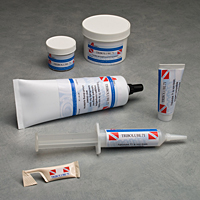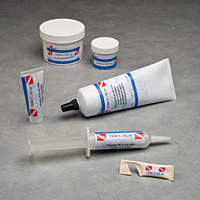I've got a full fat syringe of BRAYCOTE 640AC what can I use, should I do with it?
TDS
DescriptionCastrol Braycote™ 640 AC is a white, smooth, homogeneous NLGI Grade 2 grease based upon a blend of aperfluoroether base oil and a tetrafluoroethylene telomer. Castrol Brayco IC X-100 (previously named Fluoroclean™X100) can be used to remove this lubricant. Refer to the data sheets for information regarding these products.ApplicationBraycote 640A C is designed as an oxidizer and propellant compatible grease suitable for use in aerospace vehicles,spacecraft, rocket and aircraft engines and associated ground support equipment, oxygen equipment, and transportequipment. Braycote 640AC is typically used in the lubrication of threaded fasteners, connectors, valves, gaskets,elastomers and bearings. Perfluorinated greases, in general, exhibit excellent shelf lives due to their intrinsic inertness.
Browse Tribolube 66 in the Aerospace Lubricants, Inc. catalog including Item #,Item Name,List Price

syntheticlubricants.aerospacelubricants.com
TDS
Tribolube 66
more
Tribolube-66 is intended for use in mild to high pressure systems where nonreactive with LOX and
GOX is required, strong acids, oxidizers, fuels, and solvents is required. Is qualified to MIL-PRF-27617,
Type 1. Although this lubricant is very inert, newly exposed rubbing surfaces of aluminum and
magnesium may react with the greases under certain conditions.Tribolube-66
Browse Item # PC71-0007.T, Tribolube 71, 7 gm. Tube in the Aerospace Lubricants, Inc. catalog including Item #,Item Name,Description,Temperature Range,NLGI No.,Low Temperature Torque @-40 ºF. Starting,Low Temperature Torque @-40 ºF. 60 min. R

syntheticlubricants.aerospacelubricants.com
TDS
Tribolube-71 primary characteristic is that it uses PTFE that has not beenirradiated. Non-irradiated PTFE over long term exposure has demonstrated itdoes not corrode aluminum or anodized aluminum. Tribolube-71 has a verywide temperature range, non-reactive with strong acids, oxygen, fuels, andsolvents. It is an excellent anti-wear, extreme pressure lubricant with long life.Tribolube-71 is qualified to MIL-PRF-27617 types 1, 2, & 3.
Here's the Piranha schpeel
Tribolube 66
- Tribolube 66 replaces the Christolube mcg 129 and 129N
- A non-toxic, oxygen compatible lubricant
- Designed specifically for open circuit scuba diving systems
- Intended for use in mild to high pressure systems where nonreactive with LOX and GOX is required, strong acids, oxidizers, fuels, and solvents is required.
- Qualified to MIL-PRF-27617, Type 1.
- Although this lubricant is very inert, newly exposed rubbing surfaces of aluminum and magnesium may react with the greases under certain conditions.
- TRIBOLUBE 66 is only for static applications. This grease is also a PFPE oil that is thickened with PFPE, but has a thicker viscosity. The grease will thicken and in cold conditions can cause a sluggish response, due to the fact that it's operating range is not as wide.
- Made in the USA
Tribolube 71
- Tribolube 71 lubricant is not water soluble and is inert
- Excellent choice for rebreather divers
- Use in your valves, manifolds and regulator parts
- Use on your spg and/or your gauge connections!
- Using Tribolube 71 you don't have to worry about did you use the proper lubricant or not
- This is a 2 oz syringe
- Great for either working at home or storing in a dive kit
- Tribolube 71 is O2 safe and are compatible with all o-rings and materials used in the scuba industry
- Tribolube 71 is specifically designed for Nitrox open and closed circuit diving systems and is LOX/GOX compatible.
Does this make sense as it applies to open and closed circuit, static and dynamic
or are they trying to get you got you by the short and curlies by feeding you hay
Do the thumb and forefinger test and if it feels the same as all the other greases you tested it passes
I'm sure Old Mother Hubbard still has something in her cupboard





